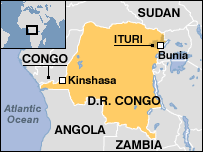Next month’s opening of the trial of Congolese militia leader Bosco Ntaganda could take place in eastern Democratic Republic of Congo (DRC) say ICC judges.
If given the green light, it would be a first for the Court. We discuss the arguments for and against.
Bringing justice closer to affected communities in Ituri
Earlier this year, ICC Trial Chamber VI recommended that the opening statements in the Ntaganda trial be held in the town of Bunia in eastern DRC.
With the trial scheduled for July 2015, the ICC Presidency, composed of the Court’s president and two deputies, must soon decide whether to allow this portion of the trial take place in situ.
(Note: The defense has requested to postpone the trial to November 2015).
Bunia is at the center of the Ituri district, one of the worst affected areas in eastern DRC’s prolonged armed conflict, during which foreign armies and local militia groups fought each other and committed numerous abuses, according to Human Rights Watch. 60,000 civilians are reported to have been killed.
Ntaganda, charged with war crimes and crimes against humanity, was a leader active in various armed rebel groups in the region since the late 1990s. He has been wanted by the ICC since 2006.
He was the commander of a militia known as M23 when surrendered to the United States embassy in Rwanda in 2013. US authorities subsequently transferred him to The Hague where he awaits trial.
ICC judges suggested that opening the Ntaganda trial in Bunia could bring the work of the Court closer to communities most affected by the alleged crimes, while at same time promoting accountability and healing.
Under the Rome Statute, the ICC’s founding treaty, portions of proceedings can be held away from the seat of the Court in The Hague.
Special courts in Sierra Leone and Cambodia have successfully demonstrated that local proceedings can promote effective and meaningful victim participation. 153,000 attended hearings in Cambodia alone.
ICC presidency weighing pros and cons
The ICC looks at the possibility of in situ proceedings on a case-by-case basis.
Holding trials locally may involve increased costs, logistical difficulties, the possibility of victim and witness intimidation, the potential politicization of the trial and security risks for ICC personnel.
The Office of the Prosecutor (OTP) says it supports holding trials, in whole or in part, close to affected communities when feasible and where the Court can ensure the protection of victims, witnesses, Court staff and the accused.
In context of the Ntaganda trial, it highlighted concerns over the availability of accommodation, finding a suitable trial venue, internet connectivity, and transportation of the accused.
Ntaganda’s defense team has underlined the importance of its involvement in developing the outreach strategy before the holding of any in situ hearings.
Meanwhile, the Legal Representatives for Victims (LRVs) in the case stated that “any effort to bring the work of international justice closer to the victims is of paramount importance, not only for the latter but for the Court as a whole.”
However, they also voiced some doubt, noting that the influence of the hearings would be reduced if they were to go ahead without Ntaganda present, as has been mooted. It was suggested that a visit by the judges to the area may be more appropriate (as had been done in the Katanga/Ngudjolo case).
Citing an earlier positive report on opening statements of the Ntaganda trial to be held in situ, the ICC Registry indicated that basic hearings, with the accused present, would be feasible. It also noted that progress has been made in the monitoring of security, planning of the courtroom and establishing outreach strategies.
Various independent expert opinions also support in situ proceedings when appropriate.
The ICC Presidency now faces the difficult task of balancing all of these factors in making a final decision.
Have your say – should the trial opening be held in the DRC?
Sign up for email updates for more news just like this.


